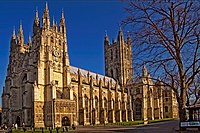Church in England
|
Church of England |
|
|---|---|

|
|
| Abbreviation | C of E |
| Orientation | Anglican |
| Polity | Episcopal |
| Supreme Governor |
Queen Elizabeth II of the United Kingdom |
| Primate |
Justin Welby Archbishop of Canterbury |
| Region |
England Wales (cross-border parishes) Isle of Man Channel Islands Continental Europe |
| Headquarters | Church House, Westminster |
| Origin |
England |
| Separated from |
Roman Catholic Church (16th century) |
| Separations |
English Dissenters Methodists (18th century) Episcopal Church (US) (1789) Plymouth Brethren (1820s) Free Church of England (1844) |
| Members | 26 million (2015) |
| Official website | churchofengland.org |
The Church of England (C of E) is the state church of England. The Archbishop of Canterbury (currently Justin Welby) is the most senior cleric, although the monarch is the supreme governor. The Church of England is also the mother church of the international Anglican Communion. It dates its establishment as a national church to the 6th-century Gregorian mission to Kent led by Augustine of Canterbury.
The English church renounced papal authority when Henry VIII sought to secure an annulment from Catherine of Aragon in the 1530s. The English Reformation accelerated under Edward VI's regents before a brief restoration of papal authority under Queen Mary I and King Philip. The Act of Supremacy 1558 renewed the breach and the Elizabethan Settlement charted a course whereby the English church was to be both Catholic and Reformed:
In the earlier phase of the English Reformation there were both Catholic martyrs and radical Protestant martyrs. The later phases saw the Penal Laws punish Roman Catholic and nonconforming Protestants. In the 17th century, political and religious disputes raised the Puritan and Presbyterian faction to control of the church, but this ended with the Restoration. Papal recognition of George III in 1766 led to greater religious tolerance.
...
Wikipedia
